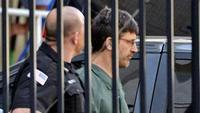-
U.K. prisons serve as recruitment centers for jihadi causes

A recent report details the growing population of Muslims in British jails, many of whom are declared Islamic extremists. Top-security prison Whitemoor, home to many extremists serving life sentences for plotting acts of terror in the United Kingdom, is considered a recruitment center for al-Qaeda, according to prison inspectors. Roughly 42 percent of prisoners at Whitemoor are Muslims, a stark contrast to the overall U.K. population in which only 5 percent practice Islam.In all, there are 11,729 Muslims in British jails, about one in seven of all inmates.
-
-
Possibility of “dirty bombs” a major terrorism threat
The International Atomic Energy Agency (IAEA) has warned that there were 140 cases of missing or unauthorized nuclear and radioactive material in 2013 — a pressing reminder that the possibility of possession of nuclear materials by terrorist organizations is both real and current.
-
-
Report critical of intelligence, law enforcement Boston Marathon information sharing
A 37-page report released by the House Committee on Homeland Security, asserts that the FBI and Customs and Border Protection (CBP) all failed properly to coordinate and investigate Tamerlan Tsarnaev in the years before his involvement in the deadly bombing attack at the Boston Marathon in 2013. “There were opportunities in which greater sharing of information might have altered the course of events, the report goes on to say, “Such failures must not be allowed to persist.”
-
-
House mulls Syria-related sanctions on Iran

U.S. House legislators are considering new terrorism-related sanctions on Iran, targeting the country’s support for Hezbollah, after ceding to the Obama administration’s request to back off on sanctions related to Iran’s nuclear program. The House Foreign Affairs Committee hopes the move will reflect their independence from the White House and also bring more focus to the Syrian crisis.Lawmakers say the bill would reflect the most effective ways to disrupt Iran’s financial support of Hezbollah.
-
-
Michigan terrorism case hinges on informant’s testimony
Mohammad Hassan Hamdan of Dearborn Heights, Michigan was arrested on Sunday, 16 March 2014, at Detroit Metro Airport by FBI agents who claim that Hamdan told an undercover informant of his plans to travel to Lebanon to join Hezbollah as a fighter supporting Syrian president Bashar al-Assad. Hamdan’s family and defense attorney note that the informantis a friend of Hamdan’s ex-girlfriend, and that he is receiving an immigration benefit for his services, two facts that should make the information he provides suspect.
-
-
Johnson makes his presence known at DHS
DHS spent much of 2013 operating with forty-eight vacancies in top management positions, but since Congress approved Jeh Johnson as head of DHS in December 2013, the department has successfully filled seventeen positions.The appointment of former chief technology officer for McAfee, Phyllis Schneck, as deputy undersecretary for cybersecurity,reflects Johnson’s attempt to bridge the gap between DHS and the private sector. Johnson has pushed for other changes in the 22-agency, 240,000-employee organization by introducing some operational philosophies gained from his time as General Counsel for the Defense Department. “Meetings at DHS are already starting about two hours earlier, like they did at DoD,” says one person with multiple contacts at the department.
-
-
Judge rebukes Sheriff Arpaio, his deputy for mocking, defying court orders
Grant Murray Snow, District Judge for the United States District Court for Arizona, earlier this week rebuked Sheriff Joe Arpaio of Maricopa County and chief deputy Jerry Sheridan for defying and mocking Snow’s order, issued last year, to stop targeting Latinos during routine patrols, traffics stops and work raids. “Whether or not the sheriff likes it, there is a distinction in immigration law that was not understood by the population and, with all due respect to you, it is not understood by the sheriff, which is that it is not a criminal violation to be in this country without authorization,” Judge Snow said pointedly.
-
-
Prosecutors ask for confidentiality in NY “Death Ray” case

Glendon Scott Crawford,a former General Electric Co. industrial mechanic, is standing trails in Albany, New York, for developed a radiological dispersal device which he tried to sell to both the KKK and to Jewish organizations so they could use it to kill Muslims. Several experts argued the device would not work since it would require massive amounts of electricity, weigh enough to crush most vehicles and would require victims to remain still in order to face prolonged exposure from close-range radiation.
-
-
Scientists learn how Marburg virus grows in cells

Infections with Marburg virus lead to death in as many as 90 percent of those infected. Once restricted to Africa, cases of the virus have been identified in travelers from Europe and the United States, making effective prevention and treatment a top biodefense priority. Study suggests targeting molecular interaction of virus and host protein may arrest this lethal virus.
-
-
Growing questions about TSA’s behavioral detection program
TSA has spent roughly $1 billion training thousands of “behavior detection officers” as part of theScreening of Passengers by Observation Techniques (SPOT) program. The purpose of SPOT is to identify facial and body expressions that signals terrorist activity. Psychologists – and the GAO – question the effectiveness of the program.“The common-sense notion that liars betray themselves through body language appears to be little more than a cultural fiction,” says one psychologist.
-
-
Delaware launches cyber initiative
Delaware is joining the number of states that have decided to invest in a statewide cybersecurity workforce to combat the growing threat of cyberattacks directed at both private and public institutions.Delaware hopes its cyber initiative will accelerate current efforts to develop a stronger cyber workforce. The Delaware Cyber Initiative proposes $3 million for a collaborative learning and research network in the form of part research lab, part business park, dedicated to cyber innovation.
-
-
Protecting personal data on smartphone
Social networking and the instantaneous sharing of information have revolutionized the way we communicate. Our mobile phones are able to automatically obtain information such as our current location and activities. This information can be easily collected and analyzed to expose our private life. What is even more malicious is that the personal data contained in our smartphones can be disclosed via installed applications without our being informed.
-
-
Quantum cryptography to help us keep our secrets secret

In the history of secret communication, the most brilliant efforts of code-makers have been matched time and again by the ingenuity of code-breakers. Sometimes we can even see it coming. We already know that one of today’s most widely used encryption systems, RSA, will become insecure once a quantum computer is built. An article in Nature reviewing developments in quantum cryptography describes how we can keep our secrets secret even when faced with the double challenge of mistrust and manipulation.
-
-
9/11 terror network in U.S. was never fully dismantled, still a threat
A joint inquiry co-chaired by a former senator has warned that the American network that supported and trained the 9/11 hijackers was never fully dismantled, and that it remains a threat, pending the release of a secret report from the era. Former Senator. Bob Graham (D-Florida) points out that a 28-page section from the “Joint Inquiry into Intelligence Community Activities Before and After the Terrorist Attacks of September 11, 2001” was classified under President George W. Bush and remains so under President Barack Obama.
-
-
FDA proposes rules to prevent terror attack on U.S. food supply
Food terrorism could have drastic economic effects. A DHS risk assessment discovered that should a pathogen like foot-and-mouth disease be introduced to Great Plains ranchers, total damages would exceed $50 billion, affecting U.S. beef exports and dramatically reducing consumer demand for beef products.In order to prevent or reduce the risk from a potential terror attack on the nation’s food supply, the FDA proposed new rules to the Food Safety Modernization Act (FSMA).
-
More headlines
The long view
Preventing Another 'Jan. 6' Starts by Changing How Elections Are Certified, Experts Say
By Sara Savat
The 2024 presidential election may be a rematch between President Joe Biden and former President Donald Trump, but preventing a repeat of Jan. 6, 2021 — when false claims of a stolen election promoted by Donald Trump and his allies led to an insurrection at the U.S. Capitol —will be top of mind this election year. Research finds broad support among public for nonpartisan certification commissions.
States Rush to Combat AI Threat to Elections
By Zachary Roth
This year’s presidential election will be the first since generative AI became widely available. That’s raising fears that millions of voters could be deceived by a barrage of political deepfakes. Congress has done little to address the issue, but states are moving aggressively to respond — though questions remain about how effective any new measures to combat AI-created disinformation will be.
Chinese Government Hackers Targeted Critics of China, U.S. Businesses and Politicians
An indictment was unsealed Monday charging seven nationals of the People’s Republic of China (PRC) with conspiracy to commit computer intrusions and conspiracy to commit wire fraud for their involvement in a PRC-based hacking group that spent approximately 14 years targeting U.S. and foreign critics, businesses, and political officials in furtherance of the PRC’s economic espionage and foreign intelligence objectives.
European Arms Imports Nearly Double, U.S. and French Exports Rise, and Russian Exports Fall Sharply
States in Europe almost doubled their imports of major arms (+94 per cent) between 2014–18 and 2019–23. The United States increased its arms exports by 17 per cent between 2014–18 and 2019–23, while Russia’s arms exports halved. Russia was for the first time the third largest arms exporter, falling just behind France.
LNG Exports Have Had No Impact on Domestic Energy Costs: Analysis
U.S. liquified natural gas (LNG) exports have not had any sustained and significant direct impact on U.S. natural gas prices and have, in fact, spurred production and productivity gains, which contribute to downward pressure on domestic prices.
